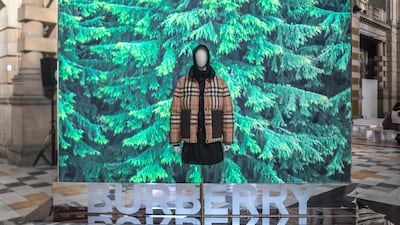Transforming fashion from climate foe to friend is its "golden opportunity", a Burberry executive said on Thursday.
The challenges presented by the conflict in Ukraine and rampant inflation should not deter or distract luxury fashion either, Julie Roche, Burberry's chief financial officer told the Bloomberg Sustainable Business event.
Ms Roche said luxury brands can be in the vanguard of the transformation as "their products have longevity and their supply chains are very well established".
To achieve this, traditional rivalries and commercial instincts must be set aside, she said.
"I think success comes from approaching this not just as individual companies, but also approaching this across the industry and across other industries as well."
"We're fashion companies: we compete on product, and we compete on customer service, but we should never compete on planet."
Ms Roche referenced Burberry's storied 160-year history, yet said it is only in the past five it has given itself "stretching" climate targets, all of which it has beaten.
She said Burberry wishes to be a sustainable fashion bellwether and to this end its target is to be not climate neutral but climate positive by 2040, making it the first luxury brand to set this goal.
The unprecedented nature of the task means that companies are learning as they go but Ms Roche said the first hurdle was simply the willingness "to get on the journey" and then share what has worked and what has not.
Measuring climate success
Lofty targets are one thing but putting cold, hard quantitative measurements on them quite another, a reality not lost on Ms Roche.
"I think it's really important just to start the measurement process," she said.
For Burberry, where most improvements need to be made is in the 'scope 3' category, which accounts for more than 90 per cent of its emissions.
There are three scopes which are used to define and quantify a company's carbon footprint:
Scope 1: direct emissions from owned or controlled sources
Scope 2: indirect emissions from the generation of purchased electricity, steam, heating and cooling consumed by the reporting company
Scope 3: all other indirect emissions that occur in a company's value chain
The larger the company, the harder the task, especially when it comes to scope 3 given a firm like Burberry possesses a sprawling supply chain with many constituent and potentially polluting parts.
But Ms Roche believes the challenge is at least easier than it was.
"I honestly think the world has changed ... it's really woken up to the importance of this," she said.
"And we work with all our partners, all of our supply chains, all the way back to farmers and herders about responsible farming and ensuring that soil is regenerated because obviously it captures carbon. So it's that circularity message."
Continuing events such as the coronavirus pandemic, the war in Ukraine and rampant inflation have led several commentators to suggest that sustainability should be pushed firmly down the list of global priorities.
Synthesising success from adversity
Ms Roche said such events make it even more important to focus on sustainability.
She gave the example of how Burberry approached Covid-19.
"Originally when [it] occurred, every company thought about how they were going to survive a major pandemic but quickly pivoted towards 'how do we make ourselves stronger? How do we make ourselves more sustainable?'
"And I think with the recent events in Ukraine, it can probably only strengthen that message overall."
She also scotched the notion that the interests of the environment and those of the economy are mutually incompatible.
"It's interesting about inflation and cost," she said.
"What we're actually finding is that although some things are more expensive to do, if you do them in a sustainable way, overall they're economically beneficial.
"It can save money by being more thoughtful in the buy and getting better sell-through.
"So all the time I am joining finance with sustainability metrics in everything we do."

